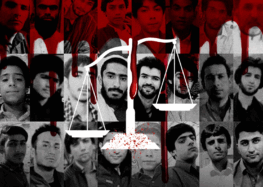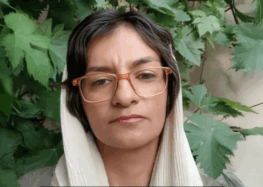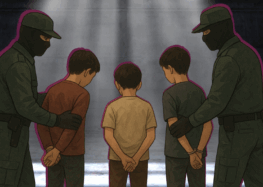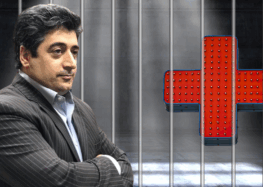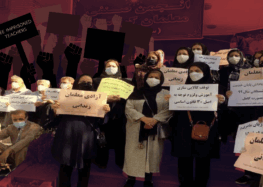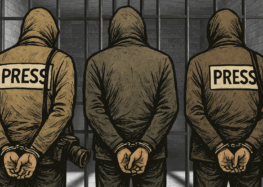Iran’s Qarchak Prison: A Place of Death That Must Be Closed
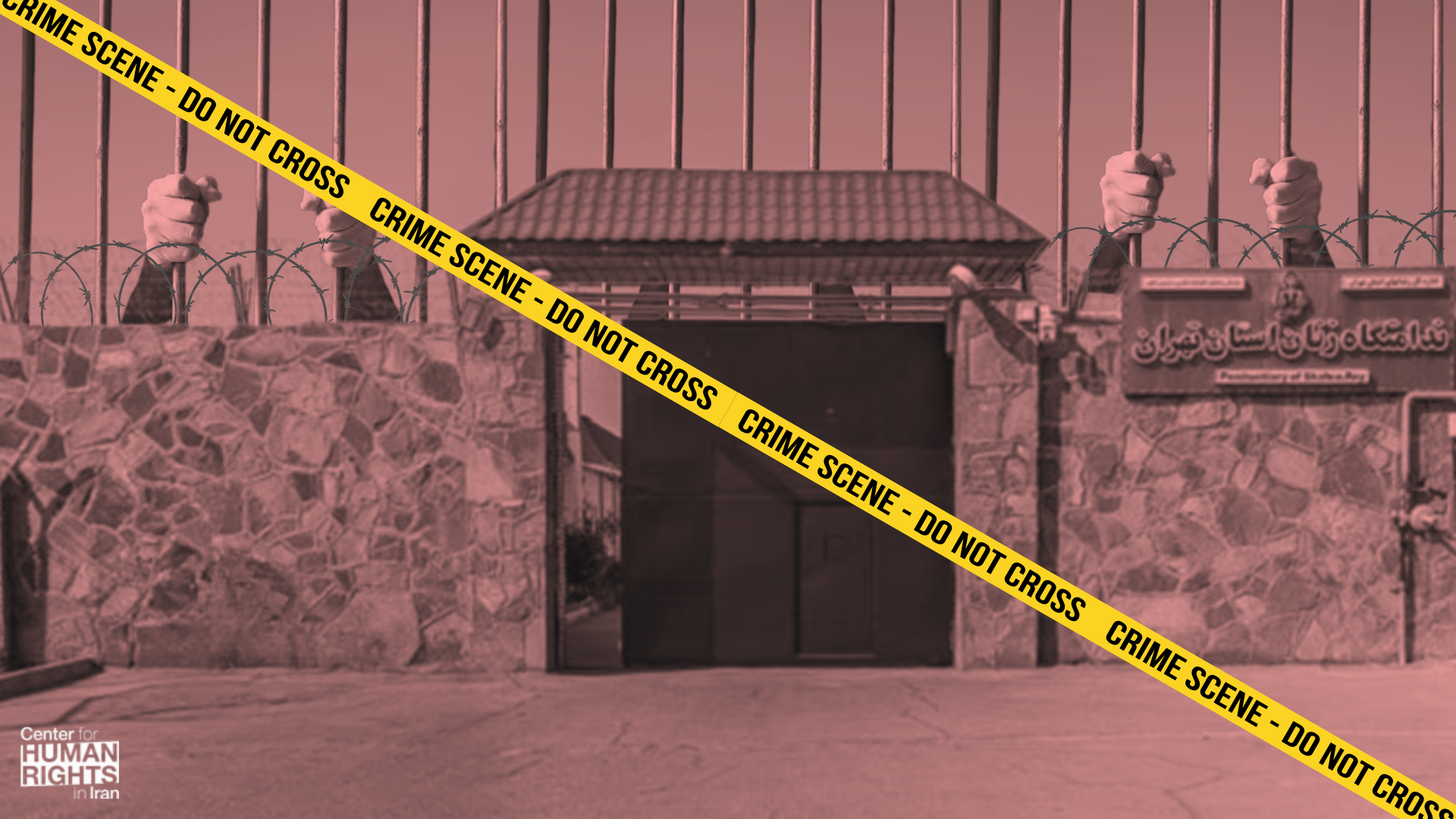
Three Women Prisoners Dead in Ten Days After Denial of Medical Care
October 7, 2025 — In the span of just over a week, three women have died from the denial of medical care in Iran’s Qarchak Women’s Prison—an overcrowded, disease-ridden facility infamous for abuse and inhumane conditions. These latest deaths underscore the crisis in Islamic Republic prisons arising from the Iranian authorities’ systematic denial of essential medical care to prisoners.
“Prisoners are not dying—they are being killed by the Islamic Republic’s intentional denial of critical medical care at Qarchak Prison, and more will die in the coming days without immediate international action to hold Iranian authorities accountable,” said Bahar Ghandehari, director of advocacy at the Center for Human Rights in Iran (CHRI).
With conditions that pose a direct threat to life, Qarchak is a living hell for the women being held there on various charges, including political charges. Prisoners are:
- Denied access to critical medical care, resulting in the deaths of inmates
- Denied access to clean water and proper food
- Subjected to physical, psychological, and sexual abuse by prison authorities
- Held together with violent criminals who pose a danger to other inmates
- Held in filthy, overcrowded conditions, where prisoners are often forced to sleep on floors
- Deprived of minimal sanitation facilities and ventilation
“The denial of essential medical care is a slow death, and it is tantamount to torture,” Ghandehari said. “Iranian authorities responsible for prisoners’ care have turned Qarchak Prison into a place of violence and death. It is time to shut it down before more lives are lost.”
In light of the recent deaths and mounting reports of the life-threatening conditions inside Qarchak, the CHRI urgently calls on the international community to demand:
- Qarchak Prison’s immediate closure
- The transfer of prisoners to facilities that meet international standards of care
- The immediate release of all prisoners in need of medical treatment
CHRI urges the UN High Commissioner for Human Rights, the UN Special Rapporteur for Iran, and the UN Special Rapporteur on torture to directly address the crisis of the intentional and systematic denial of essential medical care in Iranian prisons, and demand immediate and unfettered access by independent observers to tour Qarchak Prison.
Women Inmates Dying Due to Denial of Medical Care
On September 25, 2025, Somayeh Rashidi, a political prisoner, died due to the repeated denial of medical care by prison authorities at Qarchak Prison and the failure to transfer her in time to medical facilities.
Rashidi, age 42, was violently arrested in April 2025 in Tehran for writing slogans critical of government policies. Officers slammed her head against a wall, sat on her chest, and inflicted multiple blows to her face, legs, and abdomen.
She was imprisoned in Evin Prison and transferred to Qarchak Prison following the Israeli attack on Evin in June 2025. Her health deteriorated throughout her detention, while her repeated requests for care and concerns raised by her family and cellmates were ignored by prison authorities. Sedatives were prescribed instead of treatment. On September 15, 2025, she suffered a seizure and was taken to the hospital in a semi-conscious state, where doctors told her family that the delayed transfer caused irreversible damage. She died 10 days later.
Forty-five women political prisoners in Qarchak Prison issued a joint statement following Rashidi’s death, testifying to her deteriorating health due to the deliberate denial of care:
“…multiple times in front of our eyes—especially in the last two months—[Rashidi] experienced severe seizures in short time intervals, and after being transferred to the infirmary, without being sent to the hospital for admission, without addressing her emergency condition…they returned her to the prison.”
A source close to her family told HRANA:
“Ms. Rashidi had long complained of health problems, but prison officials, despite her repeated visits to the infirmary, refused to take her condition seriously. On some occasions, they even accused her of faking illness. She was only given psychiatric and sedative medications, which further worsened her health. On September 15, she suffered a severe seizure and was taken to Mofatteh Hospital with a consciousness level of five. According to hospital doctors, the delay in her transfer was the primary cause of her irreversible deterioration.”
Rashidi’s case gained some measure of international attention because she was a political prisoner. But a little over a week before her death, two other women prisoners at Qarchak, both held on financial charges, also died due to the denial of essential medical care at the prison.
On September 19, 2025, Jamileh Azizi, held in Qarchak Prison on financial charges, died due to medical neglect. She was transferred to the prison infirmary with symptoms of a heart attack. After examination, the infirmary doctors told her there was nothing wrong, despite clear warning signs, and sent her back to her ward. She died shortly after returning to the financial ward of Consultation Hall 2.
According to a prisoner in Qarchak, quoted by IHRNGO:
“The women cried, screamed, protested… but nobody came. She [Azizi] died before our eyes. Her eyes remained open as they carried her out of the ward.”
On September 16, 2025, Soudabeh Asadi, another Qarchak prisoner, also died due to the denial of medical care and the authorities’ failure to transfer her to medical facilities on time.
Meanwhile, earlier this year, another female prisoner, Farzaneh Bijanipour, died at Qarchak Prison on January 11, 2025, due to inadequate medical attention.
Prisoners Hunger Strike in Protest
Hunger strikes are frequently used by prisoners in Iran who are desperate to draw attention to their plight and the authorities’ crimes and abuses. These preventable deaths at Qarchak Prison have triggered numerous such strikes—despite the fact that prisoners who go on hunger strike risk not only their health, but reprisals by prison authorities.
Mehdi Farahi Shandiz, a teacher and political prisoner held in Evin Prison, has been on a hunger strike since September 28 to protest the death of Somayeh Rashidi, the inhumane conditions in Qarchak Women’s Prison, and the deprivation of prisoners from medical care. Farahi was arrested during a teachers’ gathering for International Workers’ Day on May 1, 2025, in Tehran.
Hamid Ardalan, another political prisoner held at Evin Prison, also began a hunger strike to protest the death of Rashidi. Ardalan said he will continue his strike until all political prisoners are transferred from Qarchak to Evin’s women’s ward and guaranteed access to medical care.
“I declare that until the women political and ideological prisoners are transferred to the women’s ward of Evin and provided with proper medical care, even if my corpse is left in your hands, I will not end my hunger strike.”
On September 30, 2025, 19 women political prisoners in Qarchak Prison launched a two-day hunger strike to mourn Rashidi’s death. The women also protested the prison authorities’ conduct, lack of accountability, and their refusal to transfer them back to Evin Prison.
Narges Mohammadi, Nobel Peace laureate and political prisoner now on medical leave, said:
“Detaining sick prisoners in the prisons of the Islamic Republic is a clear example of torture, and killing them by denying their right to medical care is an act of crime.”
Qarchak: A Hell for Women Prisoners
Situated in a dry, desert area 17 km (10.5 miles) south of Tehran, near the city of Varamin, Qarchak Prison—originally built as a poultry farm and later used as a men’s rehab center—was turned into a women’s prison in 2010. It has long been known as one of Iran’s most abusive prisons, with unlawful, dangerous, and inhumane conditions.
After Israel’s unlawful attack on Evin Prison, many female political prisoners in Evin were mass transferred to Qarchak Prison. Reports from the few prisoners who have managed to reach their families paint a grim picture: the wards are dangerously overcrowded, filthy, infested with insects and pests, lacking proper ventilation, and utterly unfit for human habitation.
According to a December 2024 report by Iran Human Rights, Qarchak Prison was converted into a women’s prison without structural changes. There are no windows. The wards—essentially large industrial sheds—have a capacity of fewer than 100 people, but often hold more than 150 inmates, and at times as many as 600, leaving women without even floor space to sleep.
Qarchak holds not only women but also children, who live there with their mothers until the age of two.
A former staff member of Qarchak told HRANA:
“One of the prison’s most serious problems is poor medical care. The infirmary doesn’t even have a blood pressure monitor. Oxygen tanks are often empty, the ECG machine is broken, and no defibrillator is available. Transfers to hospitals face complicated procedures and are frequently blocked.
“Medicine is in short supply—sometimes a single bottle of syrup is given to all prisoners with a common cold. Due to overcrowding, each prisoner is permitted only one infirmary visit per month. Even basic equipment, such as stretchers and wheelchairs, is missing, severely limiting urgent care.”
In a recent interview with CHRI, the lawyer of several current and former inmates of Qarchak described how the prison suffers from frequent water and power outages and lacks proper cooling systems despite temperatures regularly reaching 101°F (38°C) in the summer (nor heat in the winter, despite temperatures as low as 2°C (35°F)).
These conditions have fueled the spread of skin diseases among prisoners, the lawyer said. Broken plumbing in the bathrooms forces inmates to wait in long lines to use them, while the failure of ventilation systems and basic cleaning supplies has left sanitary conditions dangerously unhygienic. In addition, the authorities often do not separate prisoners with communicable diseases from other prisoners, and even seriously ill prisoners are rarely transferred to hospitals outside the prison.
Three women political prisoners—Golrokh Iraee, a writer serving a five-year sentence, Reyhaneh Ansari, a labor activist serving a four-year sentence, and Varieshe Moradi, a Kurdish activist sentenced to death—who were transferred from Evin Prison to Qarchak, revealed brutal conditions in Qarchak where women lack basic hygiene and necessities and are forced to endure exploitation, including sexual abuse, just to secure their daily needs and survive.
“Women hunched over on short beds the size of graves, yearning for the most basic sanitary and living necessities. Amid filthy, crusted walls bearing the stains of years of hardship, many of them offer themselves to fellow inmates just to get money for a daily cigarette. For exploitation. For sexual exploitation. They submit to every humiliation—just to fill their stomachs, just to access the bare minimum of what their hearts long for.”
An earlier CHRI report on Qarchak, which contains excerpts from extensive interviews CHRI held with former and current inmates of Qarchak, detailed the horrendous living conditions, including the egregious overcrowding, lack of sanitation facilities or access to clean water and toilet facilities, the abysmal state of the infirmary which lacks even the most basic medical supplies, and the abusive treatment of the prisoners that are routine at Qarchak.
Prisoners—and their lawyers—have lodged complaints for the last 15 years, yet there have been no improvements in conditions, and demands for unfettered access by independent observers to tour the prison have been ignored by the Iranian authorities.
Lawyers who have tried to address the unlawful and inhumane conditions at Qarchak have been punished. For example, on July 23, 2022, human rights lawyer Mostafa Nili went on trial for “propaganda against the state” for giving an interview in which he described the conditions his clients have to endure in Qarchak, and was fined for his efforts.
First Female Qarchak Prison Chief Behind Systematic Abuse and Repression
With domestic accountability an impossibility inside the Islamic Republic, mechanisms of international accountability are urgently needed. Sanctioning responsible officials should be combined with prosecuting them whenever possible in third-country national courts under the principle of universal jurisdiction.
Accordingly, identification of such officials is critical. Moreover, beyond the prison warden, higher judicial and prison authorities also bear command responsibility and should be held accountable.
Soghra Khodadadi was appointed in December 2020 as the first woman to serve as director of Qarchak Women’s Prison, after working for 26 years as a prison guard. She has been intimately involved in severe violations at Qarchak.
During Khodadadi’s tenure, policies such as the imposition of mandatory chador dress, the transfer of the remains of an “unknown martyr” into the prison as a means of psychological pressure, and the staging of humiliating ceremonies were carried out. Under her watch, women prisoners—particularly political prisoners—have faced torture, denial of medical care, and other egregious rights violations.
Soon after taking office, Khodadadi oversaw a violent raid on Qarchak’s Ward 8, during which guards beat several women, including political prisoners Golrokh Ebrahimi Iraee, Saba Kordafshari, Forough Taghipour, Marzieh Farsi, and others. Prisoners reported being dragged by the hair, beaten with batons, suffering broken teeth, and left injured without medical treatment.
Qarchak Prison Conditions Severely Violate Iranian and International Law
The Iranian authorities’ systematic denial of essential medical care to prisoners is a blatant violation of both the Islamic Republic’s domestic laws and its obligations under numerous international treaties.
In a conversation with CHRI, Saeid Dehghan, a prominent Iranian human rights lawyer and director of the Parsi Law Collective, stressed that the Islamic Republic’s pattern of systematic and deliberate medical deprivation to prisoners can rise to the level of crimes against humanity (under Article 7 of the Rome Statute), and that the right to medical care is non-derogable (a right that cannot be infringed, suspended, or restricted in any way or under any circumstances), even in emergencies.
Dehghan stated that because the denial of care is considered a form of torture, it should be investigated by international accountability mechanisms such as the UN Independent Fact Finding Mission on Iran (FFMI), which was created to gather and investigate evidence of serious human rights abuses that can be used to prosecute responsible officials in independent legal proceedings, especially given the systematic nature of these violations.
Violations of International Law Regarding the Treatment of Prisoners
Top UN experts and international human rights organizations have expressed grave concerns over Iran’s systematic denial of medical care to prisoners, which violates the UN’s Standard Minimum Rules for the Treatment of Prisoners (also known as the Mandela Rules) and which has led to the deaths of numerous prisoners. The World Medical Association has also emphasized that withholding medical care from prisoners constitutes torture.
In an August 2024 statement, multiple UN experts pointed to:
“[A] pattern of ill-treatment of Iranian detainees, including lack of access to adequate medical treatment,” noting that “such deprivations may amount to torture and inhuman treatment, which is an absolute right not liable to exceptions and derogations, and a jus cogens [universally binding] norm of international human rights law.”
In addition, the presence of children in such conditions at Qarchak directly violates Iran’s obligations under the UN Convention on the Rights of the Child (CRC).
Qarchak’s conditions also violate the International Covenant on Civil and Political Rights (ICCPR), which Iran is a signatory to, and which forbids cruel, inhuman, or degrading treatment and protects the right to life.
Violations of Iran’s Laws Regarding Prisoner Treatment
The Islamic Republic’s routine treatment of its prisoners also blatantly violates the country’s own laws.
- Iran’s State Prison Organization Regulations require prisons to examine and, when necessary, treat sick prisoners, continuously monitor their health, and involve their families in the treatment process.
- Article 502 of Iran’s Criminal Procedure Code requires judicial authorities to transfer prisoners to appropriate medical facilities outside the prison when necessary, and permits the suspension of sentences if imprisonment exacerbates an existing illness.
- Article 29 of the Iranian Constitution recognizes medical care as a “universal right.”
- Article 295 of the Islamic Penal Code criminalizes failure to fulfill the duty of care that results in death, whether intentional or unintentional.
Despite these domestic and international laws and obligations, Iranian authorities routinely disregard them, particularly concerning political prisoners, causing grievous and often irreversible harm to countless prisoners and numerous preventable deaths.
This report was made possible by donations from readers like you. Help us continue our mission by making a tax-deductible donation.

